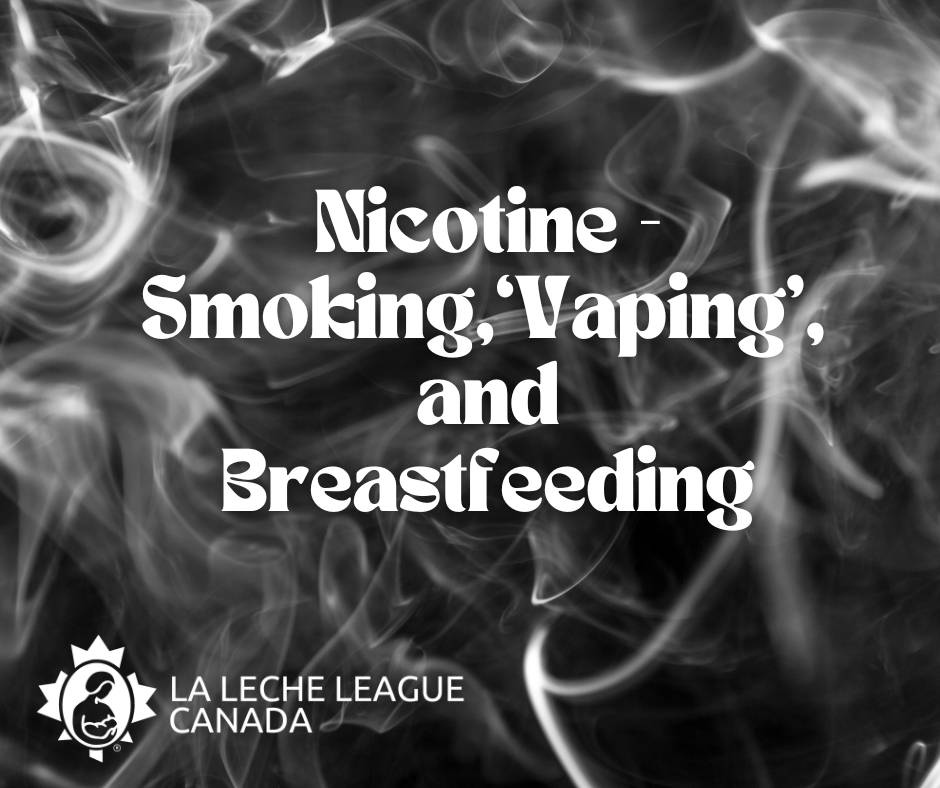
It’s important for parents to know that if you are going to smoke or use e-cigarettes (‘vape’), the best thing you can do for your baby is breastfeed. Breastfeeding can help to minimize some of the negative effects that smoking could have on your baby.
Effect on milk supply
Both smoking and exposure to secondhand smoke appear to have an impact on the hormones related to breastfeeding, oxytocin and prolactin. This may cause a reduction in milk supply and may also reduce the fat level in the milk. Smoking during pregnancy can affect a baby’s ability to suck well in the first few weeks of life. If your baby is not sucking well, this may also impact your milk supply. This does not mean that you should not nurse your baby. It just means that you might want to take extra care to have a plentiful milk supply. You can do this by feeding often and making sure that your baby has an effective latch. For more information see Establishing Your Milk Supply.
Premature Babies
Nicotine, like many other substances, does pass into your milk in some amount. Because premature babies are more fragile and less capable of handling drugs such as nicotine, it is important that you speak with your healthcare provider about any substances you may use, even if it is just an occasional use of nicotine.
Safe Sleep
Sharing a bed with a smoking parent, even if that parent does not smoke in the house, increases a baby’s risk of Sudden Infant Death Syndrome (SIDS). See SIDS Prevention and Breastfeeding. This is particularly important if the nursing mother smokes. The exposure to smoke, even on clothing, seems to dull a baby’s natural arousal mechanisms. If you smoke, it is important that you place your baby to sleep on a separate sleeping surface near you in your bedroom. This is the safest arrangement for a family where someone smokes. See Sleep and the Breastfeeding Family.
E-cigarettes, nicotine gums, skin patches, lozenges and inhalers
It appears that the amount of nicotine in a mother’s milk is lower with these products than when smoking cigarettes. There are no lung irritants, such as tars and carbon monoxide, that are present in cigarettes. Use of these products may increase the chances of quitting smoking by 50% - 60%.
How to minimize the impact of smoking on your baby
- Switch to e-cigarettes, nicotine gum or another nicotine replacement product.
- Smoke fewer cigarettes per day. If possible, quit smoking.
- Nurse your baby first and smoke immediately after. Then, if possible, wait two to three hours before nursing again. After smoking a cigarette, it takes 95 minutes for half of the nicotine in your system to be eliminated. If your baby wakes to feed in that 2 to 3-hour window, breastfeed, of course.
- Smoke outside or in a separate room.
- Change your clothes before handling your baby. (This is important for your partner to do too.)
Nursing is important for your baby even if you smoke cigarettes. When you smoke, your baby is at increased risk of colic, respiratory infections, and SIDS (Sudden Infant Death Syndrome). But babies who are breastfed are at lower risk for these diseases compared to those given formula. This is true even if their mothers continue to smoke. In addition, your milk has proteins, fats and sugars that give your baby protection against many illnesses.
If you are a smoking parent, breastfeeding is just as beneficial for you and your baby, as it is for a parent who doesn’t smoke.
If you have questions about any breastfeeding issues, La Leche League Leaders are here to provide information and support.
Please consider supporting LLLC.
References:
Mohrbacher, Nancy. (2020). Breastfeeding Answers: A Guide for Helping Families, Second Edition. Nancy Mohrbacher Solutions, Inc.
Public Health Agency of Canada. (2022, April 29). Ten Valuable Steps for Successful Breastfeeding. canada.ca
Updated 2024
